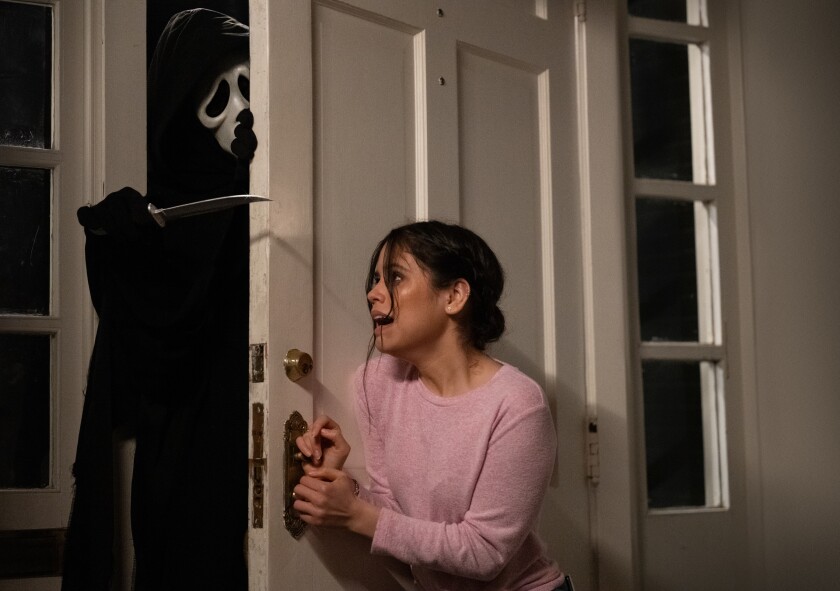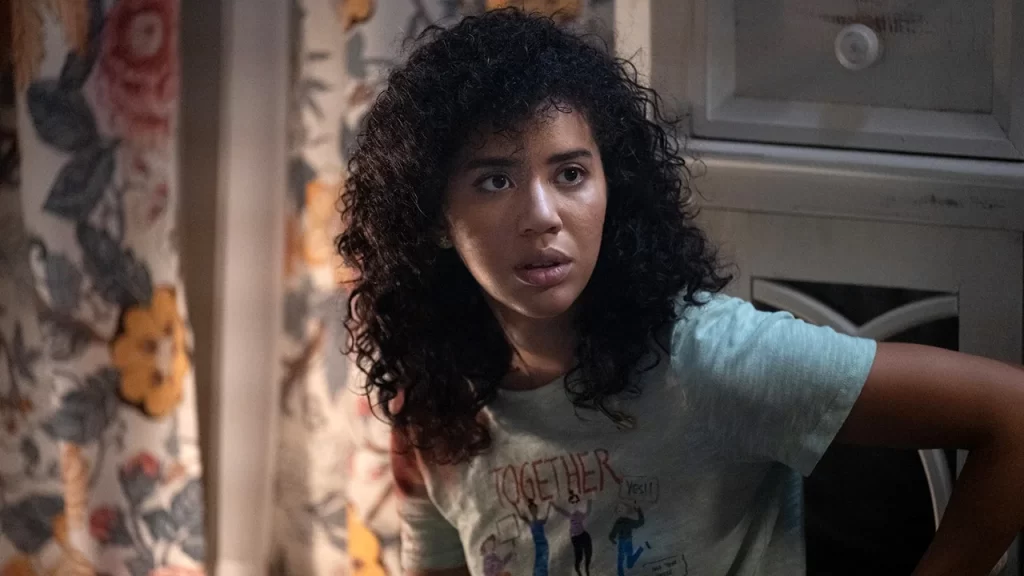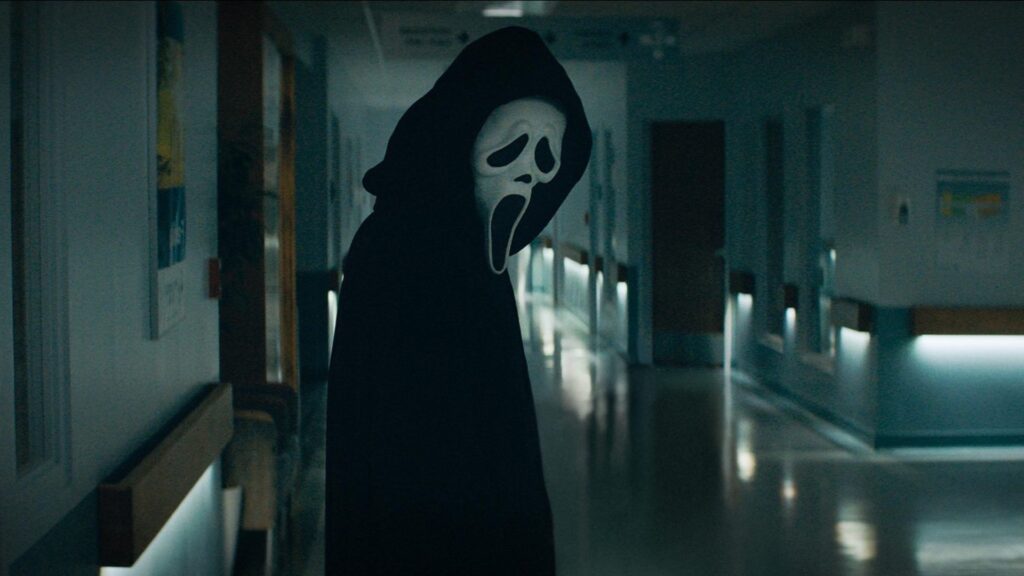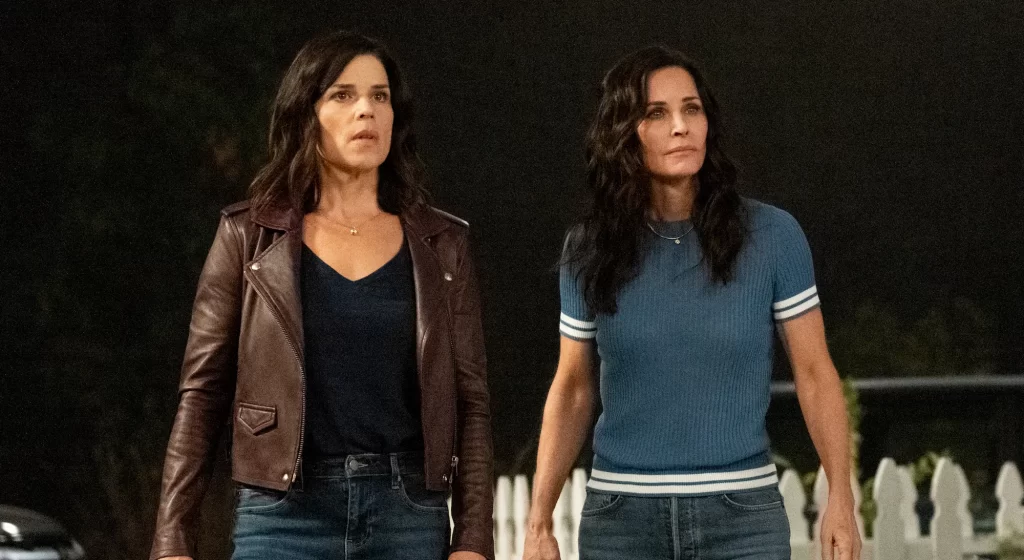
Scream is the fifth movie in the Scream franchise, which launched a quarter-century ago with a movie that was also called Scream. If you find this title repetition annoying, you aren’t alone; the film’s characters agree with you. “It should’ve been called Stab 8, not just Stab,” someone grouses at one point, referring to the series within the series that has apparently suffered from creative drought. This kind of meta commentary can be exhausting, but here it carries an element of sincerity. Despite being a bunch of cheap slasher flicks with no big stars, the Scream pictures have always aspired to a fairly lofty level of ambition, striving to combine playful semiotic analysis with genuine cinematic terror. These movies don’t just want to mock the clichés of classic horror; they also want to be horror classics.
Which this new Scream is not. Directed by Matt Bettinelli-Olpin and Tyler Gillett, the duo behind the similarly sly Ready or Not, it’s more functional than suspenseful, serving up the usual medley of shrieks, spurts, and shocks with formulaic toil. But it’s nevertheless appealing, with solid performances and a witty script (from James Vanderbilt and Guy Busick) whose insights extend beyond the usual canned callbacks and self-referential humor. The movie is predictably stocked with insignificant twists—who’s the real killer? who cares?—but its biggest surprise is that it actually has something to say.

But about those schlocky scare tactics. As with most winking send-ups, Scream arrives wrapped in a cocoon of wry self-awareness, a knowing layer of homage designed to insulate it against critical attack. The more consciously it traffics in hoary techniques—jump scares, false threats, perpetually rising music—the more clearly it’s signaling its ridicule of those techniques. So if Bettinelli-Olpin and Gillett’s set pieces rely heavily on stale tropes and cheesy gimmicks rather than true innovation, well, isn’t that just part of the joke?
Not exactly. Scream possesses greater artistic integrity than pure spoof features like Deadpool; unlike those lazy movies, which tend to mistake simulation for cleverness and simply leave it at that, it honestly wants to jangle your nerves. But this legitimate desire—or, rather, this desire for horror legitimacy—also means Scream has more to risk, which makes its shortcomings more dispiriting. The many sequences of mayhem here are largely flat and repetitive, with a coy phoniness that doesn’t justify their groaning monotony. Over and over, the camera observes someone tightly within the frame while a potential threat looms unseen behind a nearby space, Brian Tyler’s shrill score constantly intensifying as a door swings open and—like a life-or-death version of “Let’s Make a Deal”—reveals one of three options: an innocuous friend, a knife-wielding murderer, or nothing at all. It’s the kind of heightened staging meant to encourage you to yell at the characters—watch out for someone on the other side of the fridge! don’t backpedal obliviously toward the darkened closet!—yet the cumulative effect is more tedious than terrifying. With the exception of an oddly intimate execution in which a knife blade slowly pierces a victim’s throat, there are no thrills to the kills.

When Scream directly interrogates horror conventions rather than trying to imitate them, it’s more successful. As much as its screenplay is rooted in film history, it also feels productively modern, not just in how it weaponizes technology against its victims (cloned phones, location tracking, hacked security systems), but in acknowledging how the genre has evolved over the decades. The taut opening scene pays tribute to Wes Craven’s original, immortal introduction—in which a chatty Drew Barrymore got freaked out, boxed in, and sliced up—except this time, when the clueless target answers her landline(!) and is asked, in that chilling voice which belongs to the invaluable Roger Jackson, to name her favorite horror movie, she casually responds, “The Babadook.” And following a brief debate about the merits of so-called “elevated” horror (“It’s an amazing meditation on motherhood and grief.” “Sounds a little fancy-pants to me.”), Scream begins to tug at the threads of its own cinematic universe, with the killer challenging their quarry to a game of literal sudden-death trivia involving not Halloween or Nightmare on Elm Street, but the Stab pictures. Her pleading response—“Ask me about It Follows or Hereditary!”—is hysterical in more ways than one.
But don’t worry, I’m not here to litigate the relative supremacy of various subgenres, and thankfully, neither is Scream. Its primary purpose is more typical, albeit engaging. With impressive economy and methodical familiarity, it assembles a new batch of teenagers in the cursed California town of Woodsboro, quickly assigning them stock attributes and flippant lines of dialogue. There’s the uptight kid (Dylan Minnette, dangerously approaching Ben Platt “wait, he’s still in high school?” levels), the brash jock (Mason Gooding), the attractive prude (Sonia Ammar), the cool chick (Better Things’ Mikey Madison), and—most importantly—the expert cinephile (Jasmin Savoy Brown, who just completed a different kind of screaming assignment on Yellowjackets). Soon joining them is Sam (Melissa Barrera, continuing her ascent toward stardom following In the Heights), a twentysomething dilettante who left Woodsboro years ago and now warily returns, accompanied by her supportive boyfriend (Jack Quaid, channeling a ’90-era Joshua Jackson). The ostensible reason for Sam’s homecoming is that she’s the elder sister of Tara (Jenna Ortega), the unfortunate recipient of that aforementioned phone call who miraculously survived her subsequent stabbing. But Sam’s haunted gaze—and her periodic hallucinations of a digitally de-aged Skeet Ulrich in various mirrors—suggests she may carry more ominous baggage.

It’s a sizable group of characters, though their numbers start dwindling soon enough. As ever, there’s a killer on the loose: the irrepressible Ghostface, whose distinctive appearance—the long black cloak, the angular white mask, the sinister voids in place of features, all amplified by Jackson’s creepily mellifluous voice—has long earned them a place in the iconography of modern horror. One hook of the Scream features is that they operate as ongoing murder mysteries; anybody can be Ghostface, which results in escalating finger-pointing between the characters and obligatory guesswork within the audience. As deployed here, the device can be deflating, in part because, with the exception of Sam, the newbies are mostly ciphers; shorn of any emotional connection, our compulsory speculation about which among them is cosplaying as a maniac becomes a pointless exercise.
That said, Scream mines the inevitability of its setup for some solid laughs, all rooted in the franchise’s recursive self-knowledge, which is now retrofitted to examine the rules of “requels”. The characters seem to know that they’re potential victims in a Stab movie, which allows them to turn cinematic stereotypes into plausible accusations and shrewd observations. (My favorite moment occurs when Sam’s squeeze wincingly catches himself saying “I’ll be right back” before venturing solo into a basement, prompting Brown’s horror buff to casually remark, “Well he’s dead.”) To that end, the film recruits the real experts in this matter, i.e., three members of the original cast: David Arquette’s weary sheriff, Courteney Cox’s unscrupulous journalist, and the O.G. final girl herself, Neve Campbell. It’s a pleasure to see these actors in their encroaching middle age—even Ghostface calls it “an honor”—and the wizened wisdom their characters impart helps provide an excuse for their actual purpose: to tighten the links in the franchise chain, and more firmly fasten new material to old.

Which is less mercenary than it sounds. That’s because the true villain of Scream—I won’t name names, but the spoiler-averse may wish to run and hide—is fandom itself. Its new Ghostface isn’t a deranged boyfriend or vengeful parent but an angry viewer, like one of those bitter online trolls who petitioned for a remade ending of Game of Thrones or harassed Kelly Marie Tran for “ruining” The Last Jedi. The motive underlying all of the slaughter isn’t personal but artistic: to set up the ultimate retcon.
There is something disturbingly logical about this postulation: the idea that once you think you own a piece of art, you’re entitled to do anything in your power to enrich and sanctify it. The film responds to this perverse rationale with its own sneakily natural progression. If the original Scream tapped in to an entire generation’s love of slasher flicks, this identically titled Scream contemplates—with unnerving insight—the ugly process through which such love can wither into hate.
“How can fandom be toxic?” a character asks rhetorically at one point, seemingly unaware that they’re brandishing a bloody knife. Scream may not be a particularly good horror movie, but it at least concocts a vigorous answer to that question, one that squares a recently drawn circle regarding the uncomfortably hostile connection between creators and consumers. If Spider-Man: No Way Home gave fans what they wanted and The Matrix Resurrections gave fans what they needed, Scream has the audacity to remind fans that movies don’t owe them a damn thing, and that they’d be advised to think twice before logging on and starting a flame war. After all, you never know who’s monitoring you on Reddit, and you don’t want that landline to start ringing.
Grade: B-
Jeremy Beck is the editor-in-chief of MovieManifesto. He watches more movies and television than he probably should.
